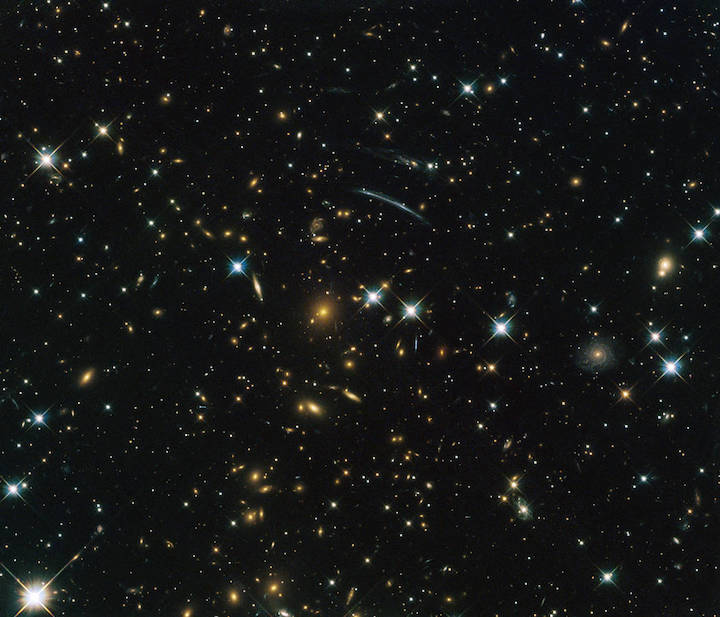Since the dawn of human thought, one question has burned in our minds with a mystery deeper than any other: Why does anything exist at all? When our ancestors looked up at the night sky, blanketed with stars, they asked not only what those shining points were, but why they were there in the first place. Why is there a cosmos to observe, rather than empty nothingness?
Every culture, every religion, every philosophy has wrestled with this question in its own way. Some traditions invoked divine creation, others cycles of cosmic rebirth, others eternal matter or endless void. But the underlying mystery remains untouched by time: Why is there something, instead of nothing?
Today, science provides us with unprecedented insights into the history and mechanics of the universe. We know about the Big Bang, about galaxies, black holes, quantum fields, and cosmic evolution. And yet, even with this knowledge, the question is not answered. In fact, it only grows sharper. The laws of physics describe how the universe behaves—but why is there a universe for these laws to govern? Why do the laws themselves exist?
Nothingness and the Shock of Being
To even ask the question, we must understand what “nothing” means. At first glance, nothingness seems simple: the absence of everything. No stars, no galaxies, no atoms, not even empty space or time. Just pure, absolute nothing.
But the human mind struggles to imagine true nothingness. When we close our eyes and imagine “nothing,” we still picture a kind of dark emptiness, a black void. But even emptiness is something—space with structure, potential, geometry. Absolute nothingness would be the absence not only of matter but of space itself, of time itself, of laws themselves.
This is why philosophers like Martin Heidegger called the existence of the universe “the fundamental mystery.” Out of absolute nothing, something is. The shock of being is not merely that stars shine or that planets spin. It is that anything exists in the first place.
Why should there be a universe capable of birthing galaxies, life, and thought, rather than the simple state of nothing at all? This is the puzzle that science and philosophy continue to wrestle with.
The Story of the Big Bang
Modern cosmology begins with the discovery that the universe had a beginning. For centuries, people assumed the cosmos was eternal and unchanging. Stars shone forever, space stretched without limit, time rolled endlessly. But in the 20th century, astronomers made a startling discovery: the universe is expanding.
In the 1920s, Edwin Hubble observed that distant galaxies were all moving away from us, with speeds proportional to their distance. The fabric of space itself was stretching. This suggested that if we rewind cosmic history, galaxies draw closer together until, at some finite time in the past, everything was compressed into an unimaginably dense and hot state.
This became the Big Bang theory: the universe began around 13.8 billion years ago, emerging from an initial singularity—a moment when density, temperature, and curvature seemed infinite. Space and time themselves had a beginning in this event.
The Big Bang is not an explosion in pre-existing space but the expansion of space itself from an initial state of extreme energy. Out of that furnace came matter, light, and the seeds of everything we see today. The cosmic microwave background radiation, discovered in 1965, is the faint afterglow of that birth, a whisper from the first light of the cosmos.
But even if we understand how the Big Bang unfolded, we are left with a haunting question: why did it happen at all? Why was there a burst of existence rather than nothingness?
The Laws of Physics as Clues
One possible path toward the answer lies in the laws of physics themselves. The universe is not chaos—it is structured, ordered, governed by deep principles. From the curvature of space-time in Einstein’s equations to the dance of particles in quantum mechanics, the cosmos behaves according to rules.
But where did these rules come from? Are they arbitrary, or are they necessary? Could they have been different? Scientists explore these questions by imagining alternate universes, governed by different physical constants. What if gravity were stronger? What if the electron had more mass? What if the speed of light were different?
Most of these imagined universes would be barren. Stars would not form, atoms would not bind, chemistry would not flourish. Only a narrow set of physical laws and constants permit complexity, and with it, life. This observation is sometimes called the “fine-tuning problem.” It seems almost miraculous that the universe has just the right ingredients for existence.
Some see in this fine-tuning the hand of design. Others see the possibility of a “multiverse”—an endless ensemble of universes, each with different laws, with ours being one in which conditions happen to allow existence. Yet even then, the question lingers: why is there a multiverse at all? Why is there something generating universes, instead of nothing?
Quantum Nothingness and the Illusion of Emptiness
One of the most intriguing scientific attempts to explain existence comes from quantum theory. In quantum mechanics, even what we think of as “empty space” is not truly empty. The vacuum seethes with virtual particles, appearing and disappearing in fleeting moments. This “quantum foam” suggests that the vacuum is not nothing, but a restless sea of potentiality.
Some physicists propose that the universe could have arisen spontaneously from such a quantum vacuum. Fluctuations in this field could spark the birth of space-time itself. In this view, the Big Bang might not require a cause beyond the laws of quantum mechanics—it could be a natural event, inevitable in the strange logic of quantum physics.
But this explanation faces a profound challenge: if the universe comes from the quantum vacuum, then why does the quantum vacuum exist? Why do the laws of quantum mechanics exist? Once again, we find ourselves staring at the ultimate mystery: the origin of the very laws that allow existence.
The Multiverse and Eternal Inflation
Another line of thought suggests that our universe is not alone. The theory of cosmic inflation, proposed in the 1980s, suggests that in its earliest moments the universe underwent a burst of exponential expansion, stretching faster than light. In many versions of this theory, inflation is not a one-time event but eternal, spawning countless “bubble universes,” each with its own physical laws.
If this is true, then our universe is just one pocket in a vast multiverse. The fact that our universe has the right conditions for life would not be surprising; in an infinite variety of universes, at least some will have the right conditions.
But even if this cosmic ocean exists, the question is not escaped. Why does the multiverse exist? Why is there an inflationary field at all? The ultimate “why” seems always one step beyond our grasp.
Philosophical Reflections: The Question of Nothing
Philosophers remind us that the question “Why does the universe exist?” may be more difficult than we think. Some argue it may be unanswerable, that human reason cannot penetrate this ultimate mystery. Others argue that nothingness is unstable, that existence is in some sense inevitable.
Leibniz, in the 18th century, framed the question in its classic form: “Why is there something rather than nothing?” For him, the answer lay in God, a necessary being whose existence explains the existence of everything else. Modern thinkers, both religious and secular, continue to debate whether a “necessary reality” is required—something that must exist by its very nature, from which all else flows.
For some, the universe itself may be necessary. For others, the laws of mathematics or logic may underpin reality. Still others suggest that perhaps the question is ill-posed, and that existence simply is, without cause or explanation.
The Human Place in the Mystery
Beyond physics and philosophy, the question touches something deeply human. We are not detached observers; we are part of the universe, products of its 13.8 billion years of unfolding. To ask why the universe exists is also to ask why we exist, why consciousness has arisen to ponder its own origins.
In this sense, the question is not merely scientific but existential. The universe gave birth to stars, to planets, to life, and eventually to beings capable of awe. Our search for the meaning of existence is itself part of the universe’s story. Perhaps the universe exists precisely to give rise to such questioning, to experience itself through consciousness.
Einstein once wrote, “The most incomprehensible thing about the universe is that it is comprehensible.” That fact—that we can grasp cosmic laws, write equations that describe galaxies and atoms—suggests a deep resonance between mind and cosmos. Our ability to wonder may itself be a clue, however subtle, to the nature of existence.
Between Science and Silence
In the end, the question may lie at the border between science and philosophy, between explanation and mystery. Science can describe how the universe unfolds, how matter forms, how galaxies shine. But the ultimate “why”—why there is something instead of nothing—may forever elude definitive proof.
And yet, perhaps that is fitting. The universe’s existence is not merely a puzzle to solve but a wonder to experience. The night sky, with its oceans of stars, does not demand an answer so much as it evokes awe. In its immensity, its beauty, its sheer fact of being, we encounter a mystery that transcends explanation.
The Eternal Question
So why does the universe exist at all? The answers we have are provisional, partial, and perhaps always will be. It may be that the universe is the necessary expression of laws we do not yet understand. It may be that it is one of countless universes, or that it arose from quantum fluctuations, or that it has always existed in some form. Or it may be that existence is an irreducible fact, a mystery without cause.
But even without a final answer, the question itself is a gift. It drives us to seek knowledge, to stretch imagination, to unite science and philosophy in a shared quest. It reminds us of the fragility and preciousness of life, for in a universe that might not have been, we are here, alive, aware, capable of love and wonder.
And so the question remains, not as a burden but as a source of meaning. The universe exists, and in asking why, we participate in its greatest miracle.






